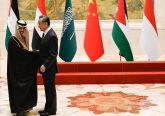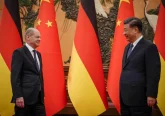Dr Tristen Naylor, Oxford’s Lecturer in Diplomatic Studies, chatted with Tom Fletcher, the former British Ambassador and Downing Street foreign policy advisor, about his new book, Naked Diplomacy.
In this three-part series their discussion explores everything from diplomacy in the digital era to the divide between academics and policy makers — with a nod to the intertextuality of W.H. Auden and Black Sabbath along the way. See Part II here.
TN: Tom, your new book is Naked Diplomacy and your blog is The Naked Diplomat. Borrowing from Jamie Oliver as the ‘Naked Chef’, who sought to strip cooking back to its bare essentials, you’re seeking to do the same with diplomacy. Why do you think that doing so is necessary now?
TF: Primarily because diplomacy matters now more than ever, and yet like every other business it is being disrupted and undermined. My argument is that you have this enormous amount of change coming at us thanks to digital technologies and that’s going to create loads of winners and loads of losers.
At any similar transition point in the past, it’s resulted in political revolutions, upheavals, and world wars- times when you need diplomats more than ever. At the same time, though, diplomacy is getting weaker because of austerity, because of Iraq and Afghanistan, because of a sort of inward-ness in Europe – look at the Brexit debate – and there’s a retreat generally from world leadership on lots of issues by the leading power. And so right when we need diplomacy, it’s struggling. It has to adapt and get better.
We have to strip away all the crap, all of the paraphernalia that surrounds diplomacy and focus on what it does best. And for me it comes back to that caveman in the book, Ug. It’s about getting the guy next to you to stop clubbing you over the head and making the case there you’re better off hunting for resources together. So, yes, there’s Jamie Oliver, but the naked diplomat is really that caveman.
TN: I think one of the interesting things about the argument for the need to strip things back to basics is that it comes at a time when a lot of the academic literature has gone the other way and is obsessed with adding things on. There’s a proliferation of hyphenated-diplomacy: proto-diplomacy, homo-diplomacy, para-diplomacy, and so on. There’s a fetish for attaching prefixes, which I think puts us in danger of stretching the concept to meaninglessness.
Perhaps I’m too cynical, but a lot of this might be a result of academics desperately trying to make careers for themselves by inventing niches within which they can then write and publish. Do you see this proliferation of hyphenated diplomacy in the practice world? Or is this confined to the ivory towers?
TF: I think that’s a really good point. I think International Relations as an academic subject is becoming more obscure and that’s a trend that probably comes from the pressure to publish as you suggest. It makes IR as a discipline less engaged with – and relevant to – the day-to-day of the practice of international relations, especially the reality of digital diplomacy.
TN: A lot of sound and fury signifying nothing.
TF: Exactly. On the other hand, you’ve got people doing diplomacy and struggling with the reality of time speeding up and having less and less time to think strategically. Scholars are positioned to do this big-picture, strategic thinking. The trouble is, practitioners have less time than ever to engage with academic literature and – even if they did – what’s being produced is either divorced from reality or written so as to be unintelligibly obscure.
TN: Or both.
TF: Yes. So what we have is both the practice worlds and the academic worlds spinning away from each other. This is worrying, it means you don’t have depth to the policy making and you don’t have a reality to the academic stuff.
TN: Coincidentally, this was one of the problems I wrestled with back when I worked for the Canadian government. That was nearly a decade ago and we’re still in the same place where you’ve got these two solitudes speaking right past each other, despite the fact that they could only possibly benefit from one another.
TF: I think this even extends to diplomatic training. One of the things I’m helping with now is the Diplomatic Academy in the UAE. The classic approach to teaching diplomacy is to teach international humanitarian law, the treaties, how the UN works, protocol, etiquette, and so on. Yet, when you talk to diplomats who are actually doing the work, what they say needs to be taught is curiosity, courage, creativity, communications, resilience, and so on. So even in the teaching of diplomats, we really don’t have a good, practical rule book on how to do the job.
TN: Well, we’ve got quite a few but they’re all old products of (and for) very different eras. The likes of Satow and Nicholson are still kicking around; that they’re still the go-to texts serves to perpetuate a particular kind of diplomacy that simply isn’t built for purpose in today’s world.
We’re training diplomats in how to arrange seating plans when we should be teaching them how to be effective communicators. And even when we do talk about something like communication, the texts being used are talking about telegrams and fax machines.
TF: Exactly, it’s all pre-internet! That’s why I included the chapter on negotiations. Negotiation is an essential feature of diplomacy whether you have a smartphone or not; but armed with a smartphone, quite how you conduct negotiation is radically altered.
TN: And this holds true for other essential dimensions: communication, representation, and so on.
TF: We need to be less snobbish about diplomacy and treat it less as a sort of special cult. We can learn from lobbyists, business people, brand managers, and so on because we do the stuff that they do; and they’re adjusting to the digital age much better and much more quickly than we are.
TN: And to do this diplomacy has to shed its self-perception as being an exalted, separate guild. Otherwise it’ll get left behind, which is one of the key arguments in your book. One concern I have is that in being threatened with the loss of its exclusive status, we might actually see a calcification of the guild and its trappings, serving to actually speed up status quo diplomacy’s decline and marginalisation.
TF: Exactly, you’ve hit the nail on the head there. Some of this comes from insecurity and there’s that fear that as soon as you open it up and let more people in, they’ll figure out that – actually – the emperor has no clothes.
All these outsiders will say, ‘Wait a second, what is it that you actually do?’ and they’ll be saying it at a time of vulnerability for diplomats when they’re already finding it harder to claim legitimacy. So, you’ve got to go out and find new sources of legitimacy because if you hide away you then become like every other industry that hides away- ignored at best and displaced at worst.
TN: I think this also speaks to one of the criticisms that runs throughout the book wherein you take aim at diplomatic egos. You’ve got that nice quip that the more an ambassador relies on the title of ‘Excellency’ the less excellent they tend to be.
TF: It’s true.
TN: I agree. My concern is that in feeling status anxiety, such egos will try to protect themselves with the frilly trappings of a bygone era when they should really be doing exactly the opposite, instead seeking legitimacy and authority from sources other than fancy titles and formal protocol.
TF: I think that is a risk, a real risk. I often think about the way that diplomats talk to the rest of the world. You’ll ask them something like, ‘What’s the latest situation in Somalia?’ and they’ll say something empty and meaningless like, ‘Well, of course it’s complex.’ Of course, this is really the sort of statement that is meant to say ‘it’s too complicated for you and – anyway – it’s all confidential and secret’.
TN: It’s a discursive move that at once claims authority and denies access.
TF: Yes, and the truth behind the statement is that they haven’t got a clue and they don’t what’s going to happen next. Again, this, alongside the platitudes, is what I really worry about: diplomats becoming more and more closed off and less and less engaged with the sources of new power and information.
TN: I think we see this same sort of status anxiety expressed in academia as well. Too often fancy jargon and intricate models are used as a means of closing off access to knowledge or hiding a lack of knowledge. It’s bound to fail, just ask the Church how successful they were in trying to maintain power by keeping their books and traditions in a language other than that of the common vernacular.
And, just like in diplomacy, it can be a smokescreen for lack of new ideas too, not unlike what we were saying before about the proliferating sub-types of diplomacy. In losing its privileged position as the authoritative source of knowledge, academia and diplomacy are in so many ways cloistering themselves exactly when they should be opening up.
See Part II here.
Tom Fletcher CMG (@TFletcher) is the former UK Ambassador to Lebanon and a Visiting Professor at New York University and the Diplomatic Academy. He campaigns for global education, the UK’s creative industries, and the power of social media to create positive change.
Dr Naylor (@TristenNaylor) is Departmental Lecturer in Diplomatic Studies at the Oxford Department of International Development and Deputy Director of the G20 Research Group, London.






